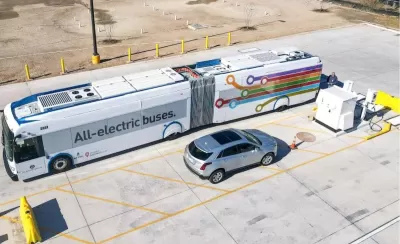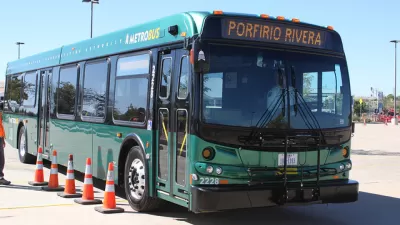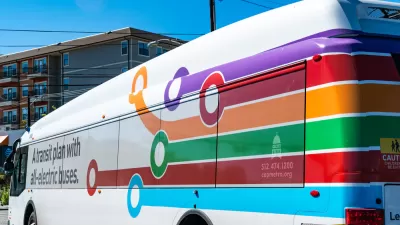Technology problems, short ranges, and supply chain issues hinder Cap Metro’s ambitious electrification plan.

Austin’s Capital Metro is pausing its ambitious plan to shift to an all-electric transit fleet, reports Nathan Bernier for KUT News.
Although voters approved funding for an all-electric transit system through the 202 Project Connect, Cap Metro officials are citing issues with the technology, including a significantly shorter range, as the cause the reversal. “Data obtained by KUT through the Texas Public Information Act revealed CapMetro's battery-electric buses are far less reliable than their diesel counterparts. E-buses had mechanical failures on average every 1,623 miles over the last year — less than half the typical distance between failures for the fleet as a whole.”
The two companies contracted by Cap Metro to deliver the electric buses also faced financial troubles and supply chain issues, with one going out of business. Currently, Cap Metro operates 23 electric buses out of a fleet of 402, with 87 buses on order. “Capital Metro now argues that having a reliable transit service, even with diesel buses, is better for the city and the environment than less reliable public transit with an all-electric fleet.”
FULL STORY: CapMetro stops shift to all-electric bus fleet

Rethinking Redlining
For decades we have blamed 100-year-old maps for the patterns of spatial racial inequity that persist in American cities today. An esteemed researcher says: we’ve got it all wrong.

Montreal Mall to Become 6,000 Housing Units
Place Versailles will be transformed into a mixed-use complex over the next 25 years.

Planetizen Federal Action Tracker
A weekly monitor of how Trump’s orders and actions are impacting planners and planning in America.

Santa Clara County Dedicates Over $28M to Affordable Housing
The county is funding over 600 new affordable housing units via revenue from a 2016 bond measure.

Why a Failed ‘Smart City’ Is Still Relevant
A Google-backed proposal to turn an underused section of Toronto waterfront into a tech hub holds relevant lessons about privacy and data.

When Sears Pioneered Modular Housing
Kit homes sold in catalogs like Sears and Montgomery Ward made homeownership affordable for midcentury Americans.
Urban Design for Planners 1: Software Tools
This six-course series explores essential urban design concepts using open source software and equips planners with the tools they need to participate fully in the urban design process.
Planning for Universal Design
Learn the tools for implementing Universal Design in planning regulations.
City of Camden Redevelopment Agency
City of Astoria
Transportation Research & Education Center (TREC) at Portland State University
Regional Transportation Commission of Southern Nevada
Toledo-Lucas County Plan Commissions




























